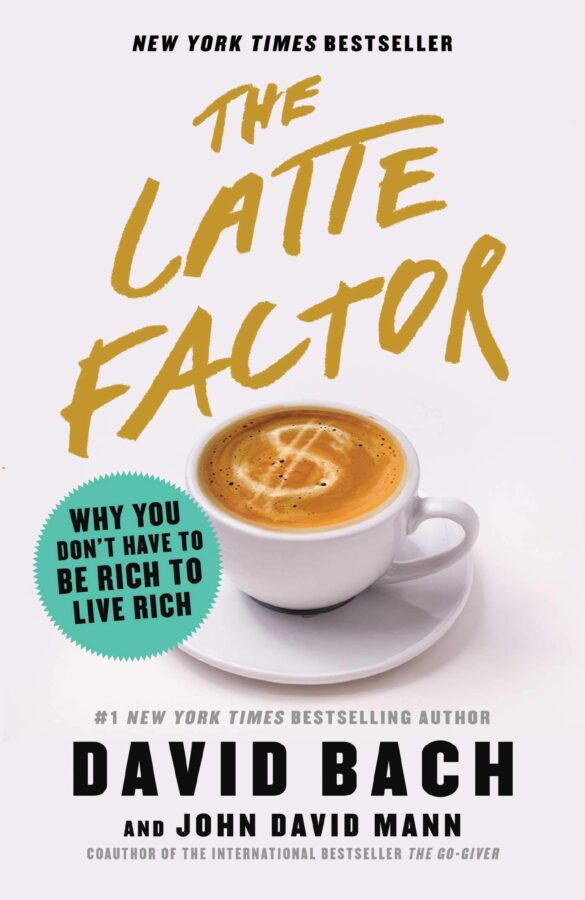Many financial tasks feel impactful but aren’t. Learning to spot the difference can help you make more impactful decisions.
David Bach is a bestselling personal finance author who, among much else, is known for his idea that the money you spend on coffees could instead make you a millionaire.
I’ve read that he was on Oprah once, and in a typical Oprah flourish, he delivered a giant pile of $1 bills to show what your coffee money could do. (Unfortunately I wasn’t able to find this clip on YouTube, so if anyone knows where I can find it, please let me know in the comments.)

I’m not disagreeing with the math here. It’s easily shown that he’s right.
But I think that David Bach may have inadvertently pushed people away from financial wellness with this remark.
I can’t tell you how many times clients (or prospective clients) say something like this to me:
“I’m afraid to start budgeting because I’m afraid you’ll take my coffee away!”
It’s like David Bach is the reason why I don’t have more clients!
But anyway, what this brings up for me is that people spend a lot of their energy thinking of small things that they can do to improve their financial standing while simultaneously avoiding the larger opportunities.
And this is a problem because it leads people to feel like they are making more progress than they are.
Let’s see how this plays out.

Table of Contents
Easy vs. impactful
Some financial decisions feel easy. Some financial decisions are impactful. And these are often in opposition.
Take the situation of wanting more money in your budget. What’s the easy decision? Do a refinance of your home and lower your payments!
The idea is enticing, and plenty of companies will make it very easy for you to do just that. But that doesn’t make it an impactful decision.
Why not? Because refinancing doesn’t change your financial position; it just moves money around. With a lower monthly cost, you will actually pay more over the long run. And you often have to pay closing costs too. (Here’s a video I made about refinancing your home.)
But you will probably net a few hundred bucks a month, so it will feel like you are doing something.
So what would be a more impactful task if you wanted to come up with a few hundred dollars a month? Here are two ideas:
- Track your spending. You will spend less just by doing it, and it will make it easier to identify areas for spending that you can alter without feeling a pinch.
- Increase your income. Get a second job, ask for a raise, look for a promotion.
But notice something about those two bullet points: They are all more difficult than just getting a refi.
I mean emotionally more difficult as well as technically harder. They both require more active work, take more time, have more risk, and require being confronted with potential setbacks.
Compare that to a refi: Click button, get mortgage. You know?
Even if the refi wasn’t any easier, it still isn’t the big impact that you want to have.
How many zeroes?
When you’re thinking about financial decision-making, you want to ask yourself this question: “How many zeroes does this decision have?“
By this, I mean: is this a $5 decision, a $50 decision, or a $5,000 decision?
What you want is to maximize the number of $5,000 decisions you make, and minimize the $5 decisions.
Why? Because you have a limited amount of energy to spend on this sort of thing. Decision fatigue is real. And you probably don’t want to have to think about money all day. (That’s my job.)
So if you have, say, ten “spoons” worth of financial decisions to make, why wouldn’t you make each of those spoons as impactful as possible? Remember: ten $5 spoons doesn’t even add up one a single $500 spoon!
More impactful decisions
So here are some more impactful financial decisions you can make:
- No more credit card debt. The average American pays almost $1,000 per year on credit card interest.
- Get a higher paying job. You don’t necessarily need a degree (going back to school can be one of those “easier” decisions) but I guarantee you that you could make more money in a year’s time.
- Invest for the future. Given an average annual return of 8%, putting $500 a month in a simple low-cost mutual fund will net you three-quarters of a million dollars after 30 years.
Every single one of those decisions above will radically change your financial picture. And all of them will allow you to keep getting Starbucks too.


